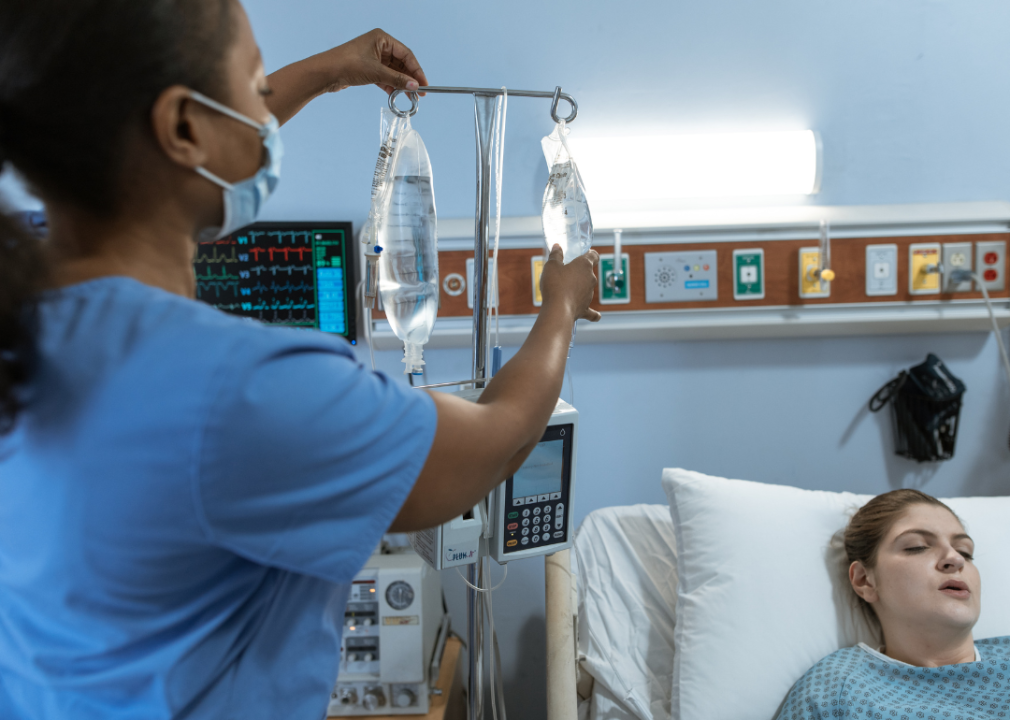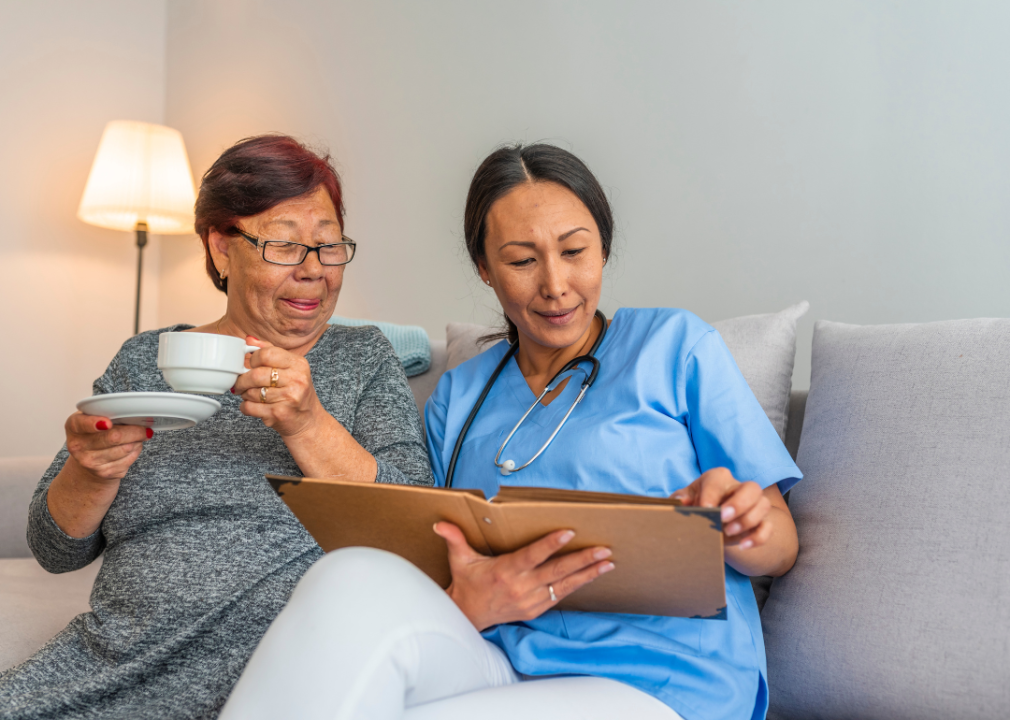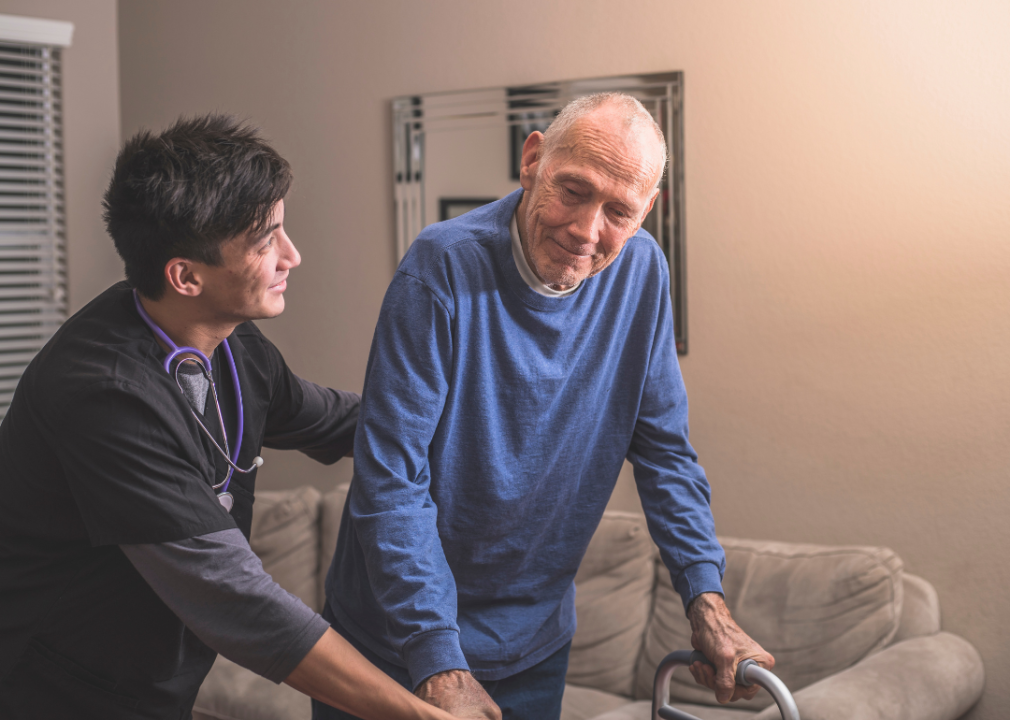8 important skills to be a registered nurse

Canva
8 important skills to be a registered nurse
A registered nurse walking down a hallway
The importance of skilled registered nurses has become more evident than ever during the COVID-19 pandemic. They are part of the front line of health care workers trying to halt the virus’ deadly path, working to keep their patients alive and themselves safe. The responsibilities of a registered nurse are wide-ranging, from recording patients’ medical histories to administering their medicines and treatments. They may consult with doctors, help perform diagnostic tests, and teach patients and their families how to manage their illnesses or how to cope with recovering from treatment or surgery at home.
While most registered nurses work with a physician or physician’s practice, this by no means denotes a limitation in terms of how and where an RN can work. In fact, nurses can and do work in a variety of fields, including as addiction specialists helping patients overcome addictions to drugs or alcohol, working in intensive-care units, caring for patients with cancer, serving as home health aides, or promoting public health.
While there is no single educational track a person must follow in order to become a nurse—degrees of study can include a bachelor’s degree in nursing, an associate degree in nursing, or a diploma from an approved nursing program—RNs must be licensed by the state in which they practice after passing the National Council Licensure Examination. Nurses also sometimes move into other aspects of health care, taking jobs at insurance companies, pharmaceutical manufacturers, or managed care organizations, for example, which need their expertise.
A shortage of nurses is worsening just as the BA.5 variant is driving up hospitalizations yet again. The New York Times noted that nearly 14% of nursing positions in acute-care facilities in Massachusetts remain unfilled. A May 2022 report from McKinsey projected a shortfall of 450,000 nurses by 2025.
In short, the world needs more nurses. Study.Com compiled the required skills and abilities needed to become an RN, according to the O*NET Resource Center. The skills and abilities were assessed via a survey of job incumbents, occupational experts, and occupational analysts who were asked about the importance of various skills related to their jobs.
![]()

Canva
Social perceptiveness
A nurse assisting a patient in a wheelchair
The U.S. Bureau of Labor Statistics found that social perceptiveness was the most highly valued trait among nurses. Defined as being aware of others’ reactions and understanding why they react as they do, nurses say the trait can help them to assess not only a patient’s medical needs but also social ones. They may be able to encourage patients to disclose problems they have been keeping to themselves or understand the concern of relatives. Some nursing programs have students take part in simulation exercises to better learn how to be aware of others’ reactions.

Canva
Active listening
A nurse listening to his patient
Among medical professionals, nurses are often the ones who first recognize a patient’s needs. Being a good listener, therefore, is an essential part of nursing care, according to a 2016 study on a nurse’s communicative role in a patient relationship. The Australian College of Nursing identified five unique aspects of active listening, among them summarizing or clarifying what has been said in order to draw out additional facts and assure that both parties are clear about what information is being relayed.
Poor communication is a significant reason for medical errors, such as misdiagnoses, wrong medications, and incorrect procedures. Such errors can lead to delays in treatment, health complications, or even the death of a patient. One Joint Commission study, as cited in the Health Insurance Portability and Accountability Act Journal, found that 80% of serious medical errors could be traced to miscommunication between caregivers while handing over patients.

Canva
Speaking
A nurse speaking to a patient
Nurses must relay information to their fellow nurses and to doctors and medical specialists. And of no less importance, they have to talk with patients and their families, who may be overwhelmed and distraught, while offering them support. Nurses may be relied on to explain the nature of a patient’s disease, the course of treatment, and a rehabilitation plan.
A look at effective communication during the first wave of the COVID-19 pandemic in the United States found that communication was important across three levels—the organization’s leadership, a medical unit’s leadership, and among nurses—and that within each of these levels presence, education, and emotional support were key aspects to successful dialogue. Knowledge about how to treat COVID-19 was evolving and hospitals, nursing homes, and other health care sites had to alter protocols. Communication was key to caring for patients and keeping nurses safe.

Canva
Critical thinking
A nurse and a doctor discuss a patient’s chart
Medical care typically requires a thorough assessment of problems and solutions and the ability to interpret data accurately. Nurses must be able to identify the strengths and weaknesses of alternative solutions and assess various approaches to solve a problem and to determine the best course of action. In an emergency, they should be able to appraise a situation quickly—and that might mean knowing when to call in another member of the medical staff.
A 2014 study on developing critical thinking in nurses—analyzing, synthesizing, and evaluating information collected through observation, experience, and communication—recommended that nursing students be encouraged to “develop independence of thought, fairness, perspicacity in personal and social level, humility, spiritual courage, integrity, perseverance, self-confidence, interest for research and curiosity.”

Canva
Problem sensitivity
A nurse helping an elderly patient
While they are not expected to read minds or otherwise bear “psychic” acuity, nurses do draw on their accumulated knowledge to manage their patients’ responses to treatment. Those skills also enable them to spot problems or potential problems. One study found that problem-based learning could help nurses improve their critical thinking. Recognizing that something is wrong allows a medical team to find the right person to solve the problem. It enables a team to evaluate options to address it.

Canva
Deductive reasoning
A nurse holding a baby
This type of reasoning is also sometimes called “top-down thinking.” It begins with a general rule or standard that can be applied to a particular problem. Nurses can start with standards set by the federal government or the American Nursing Association to determine how to care for their patients. Their state’s Nurse Practice Act, or the laws governing nursing, is another resource. By applying such standards, along with their accumulated knowledge, RNs can systematically evaluate options, eliminate those that prove incorrect or inapplicable, and move toward a course of action.

Canva
Oral comprehension
A hospice nurse visiting an elderly patient
The ability to comprehend verbal instructions for patient care can mean life or death. One examination of 23,000 medical malpractice lawsuits found that more than 7,000 were a result of communication failures. They led to $1.7 billion in malpractice costs and almost 2,000 preventable deaths. Communication breakdowns often involve a lapse in conveying information about symptoms or conditions and poor documentation of a patient’s information. The result can be the wrong treatment or delays in treatment. A hospital’s power structure can be at fault if doctors fail to heed a nurse’s observations or concerns.

Canva
Written comprehension
A nurse writing data on a medical chart
Being able to understand written records and instructions is key for nurses and their ability to care for their patients. Clinical records document a patient’s medical situation and provide information for other medical personnel involved in their care. What kind of writing nurses do depends on their field. As an article from Southwest Minnesota State University notes, a hospital nurse will mostly complete electronic health records. A nurse who works in clinical research, however, will write research and grant proposals, research reports, and similar material.
This story originally appeared on Study.Com and was produced and
distributed in partnership with Stacker Studio.